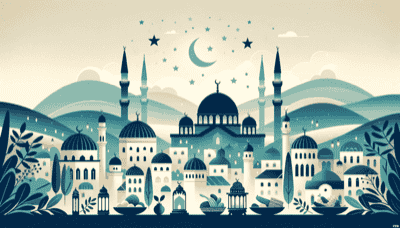We're here to help you keep count of the days to or since a date. Just click the button below and enter your chosen date to get started. Also choose the suggested days or search for a special day above #countingthedays

In Bosnia and Herzegovina, the end of Ramadan is celebrated as a national holiday known as Eid al-Fitr or Ramazanski bajram in Bosnian. This holiday falls on the first day of Shawwal, the tenth month of the Islamic lunar calendar, immediately following the conclusion of the month-long fast of Ramadan.
Eid al-Fitr has been celebrated by Muslims for over 1,400 years, originating from the Islamic prophet Muhammad. In Bosnia and Herzegovina, where Islam is one of the major religions due to Ottoman Empire's influence in history, this day is marked by a blend of religious devotion and cultural festivities.
On this day, Muslims perform a special prayer called Salat al-Eid in large congregations. The prayer is usually held in open spaces like fields or large halls or mosques. Before heading to prayer, it is customary to eat an odd number of dates and give charity known as Zakat al-Fitr, which aims to purify those who fast from any indecent act or speech and help the poor celebrate too.
People dress in their finest clothes on Eid al-Fitr. Families gather to share meals, typically starting with a small breakfast at home before heading out for prayers. After prayers, it is common for people to visit gravesites of deceased loved ones to offer respects, clean the gravesides, and recite prayers for them.
The rest of the day is filled with visits to relatives and friends' homes where traditional sweets such as baklava are enjoyed. Children often receive small gifts or money. It's a time for forgiveness, making amends, and fostering community spirit.
In Bosnia and Herzegovina specifically:
Throughout Eid al-Fitr, social bonds are strengthened within communities through shared meals and well-wishes amongst neighbors regardless of their faith background—reflecting Bosnia’s multiethnic character.